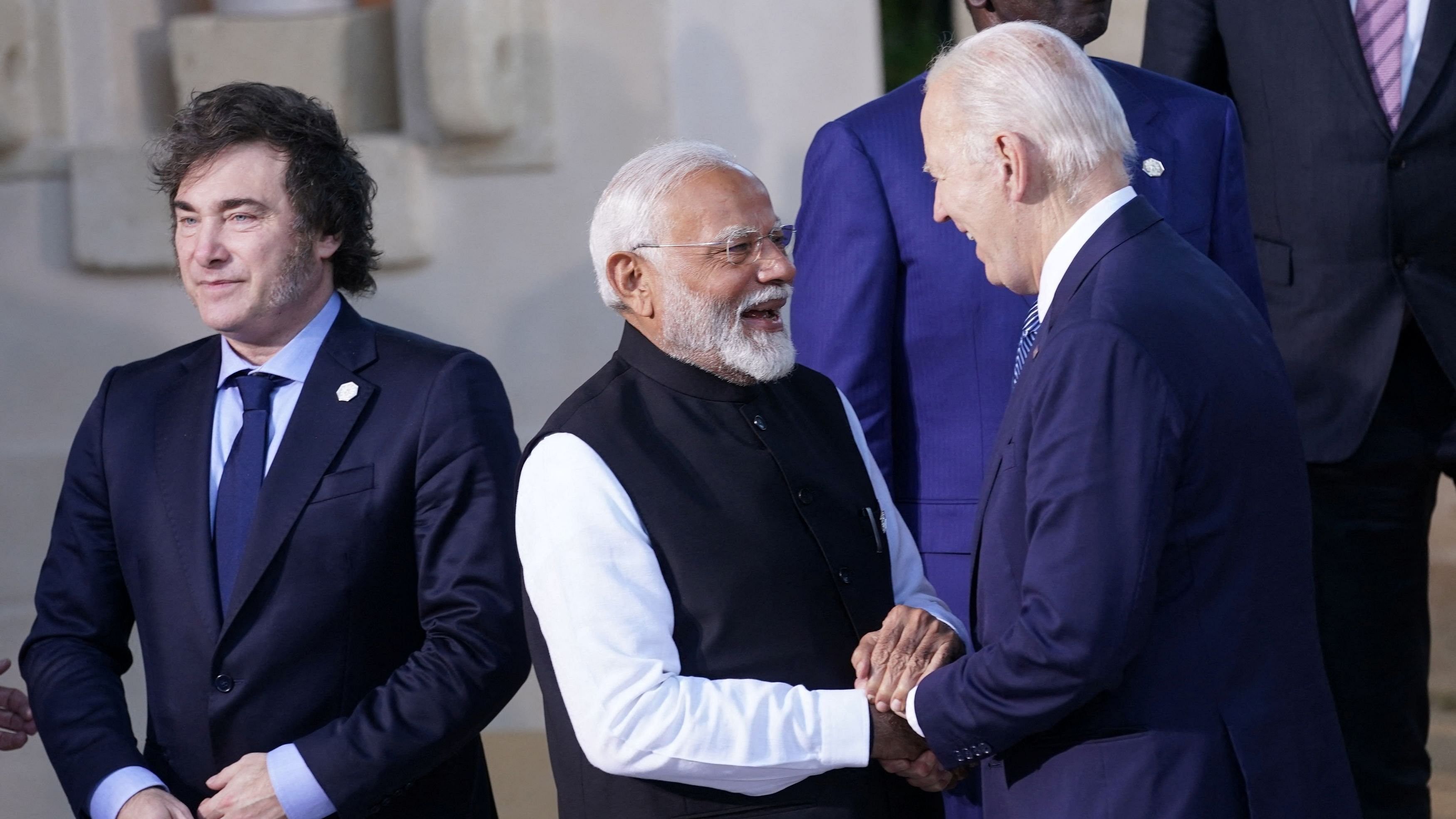
US President Joe Biden shakes hands with Prime Minister Narendra Modi next to Argentina's President Javier Milei during the family photo session on the second day of the G7 summit at the Borgo Egnazia resort in Savelletri, Puglia, Italy, June 14, 2024.
Credit: Reuters Photo
Prime Minister Narendra Modi on Friday left for home after concluding his day-long visit to Italy during which he attended the 50th G7 summit that brought together leaders from Canada, France, Germany, Italy, Japan, the UK, and the US.
He held bilaterals with several world leaders including British Prime Minister Rishi Sunak, French President Emmanuel Macron and Pope Francis.
Key Takeaways from Modi's remarks in the summit:
The world community must work towards converting the monopoly in technology into mass usage to lay the foundation of an inclusive society and help eliminate social inequalities, Prime Minister Narendra Modi said on Friday at the G7 Summit hosted by Italy.
The world community must end the monopoly in technology and ensure its access for all to lay the foundation of an inclusive society and help eliminate social inequalities, PM Modi added.
In an address at the Outreach session of the summit of G7 advanced economies at Italy's Apulia region, Modi said India will work with all countries to make Artificial Intelligence transparent, fair, secure, accessible, and responsible. The prime minister said India's approach in the field of energy is based on four principles -- availability, accessibility, affordability and acceptability.
The PM also highlighted the recently held Lok Sabha elections in his address at an outreach session of the G7 summit here and said the "blessings" that the people of India have given in the form of a historic win in the polls is a "victory of democracy".
During a meeting, the prime minister conveyed to Ukranian President Volodymyr Zelenskyy that India would continue to do everything within its means to support a peaceful solution to the Ukraine conflict and that the way to peace is through "dialogue and diplomacy".
Apart from this, PM Modi also held private meetings with Joe Biden and Justin Trudeau, among other leaders.
Modi's conversation with his Canadian counterpart came against the backdrop of severe strain in India-Canada ties over the case relating to the killing of Khalistani extremist Hardeep Singh Nijjar last year.
Meanwhile, the PM's talks with Biden came nearly seven months after Washington's allegations of an Indian link to a foiled plot to murder Sikh separatist Gurpatwant Singh Pannun in New York.
Key takeaways from the G7 Summit:
G7 Summit commits to promoting India-Middle East-Europe Economic Corridor (IMEC)
The Group of Seven industrialised nations committed to promoting concrete infrastructure initiatives such as the India-Middle East-Europe Economic Corridor (IMEC) in the G7 Summit Communique issued at the end of the three-day G7 Summit. The Communique was issued on Friday evening after the customary “family photo” at the luxury resort of Borgo Egnazia, where the G7 also reiterated a commitment to a “free and open Indo-Pacific” based on the rule of law. The Communique was issued on Friday evening after the customary “family photo” at the luxury resort of Borgo Egnazia, where the G7 also reiterated a commitment to a “free and open Indo-Pacific” based on the rule of law.
Proceeds from frozen Russian assets to give Ukraine $50 billion in loans
The Group of Seven rich democracies has agreed to use proceeds from frozen Russian assets to give Ukraine $50 billion in loans, aiming to ensure Kyiv can continue its fight against Russia's invasion and to signal Western resolve to Moscow. Meanwhile, Russian President Vladimir Putin on Friday described the West's seizure of Moscow's assets as "theft" and said it would not go unpunished.
G7 confronts China on commerce, Pope talks about AI
Pope Francis made a historic appearance at the Group of Seven summit on Friday to speak about the pros and cons of artificial intelligence, while G7 leaders also pledged to tackle what they said were harmful business practices by China. The G7 also warned of action against Chinese financial institutions that helped Russia obtain weapons for its war against Ukraine. Leaders of the Group of Seven wealthy democracies vowed on Friday to "take action" and "remedy ongoing harm" to address "unfair" business practices by China, according to a draft summit statement. They also called on China "to refrain from adopting export control measures, particularly on critical minerals".
G7 leaders commit to faster transition from fossil fuels
As per a draft statement seen by Reuters, leaders of the Group of Seven (G7) developed democracies will commit to accelerating their transition away from fossil fuels during this decade, according to a draft of a statement to be issued at the end of their ongoing summit in Italy. Other commitments on climate policy in the draft include a pledge "to phase out existing unabated coal power generation in our energy systems during the first half of 2030s."
G7 statement makes no mention of word abortion
G7 leaders made no direct reference to abortion in their final communique, with Italy refusing to bow to French pressure to include the word. The draft also sparked accusations of watering down support for LGBTQ rights compared with the statement issued at the leaders' previous meeting in Japan. Italy said it was a diplomatic storm in a tea cup and argued that the G7 had not changed its stance on either issue.
Immigration discussed
Leaders also discussed immigration, a crucial issue for Meloni who is pushing Europe to help her curb illegal flows from Africa and who has launched a flagship plan to boost development in the continent to tackle the root cause of the departures.
(With PTI, Reuters inputs)